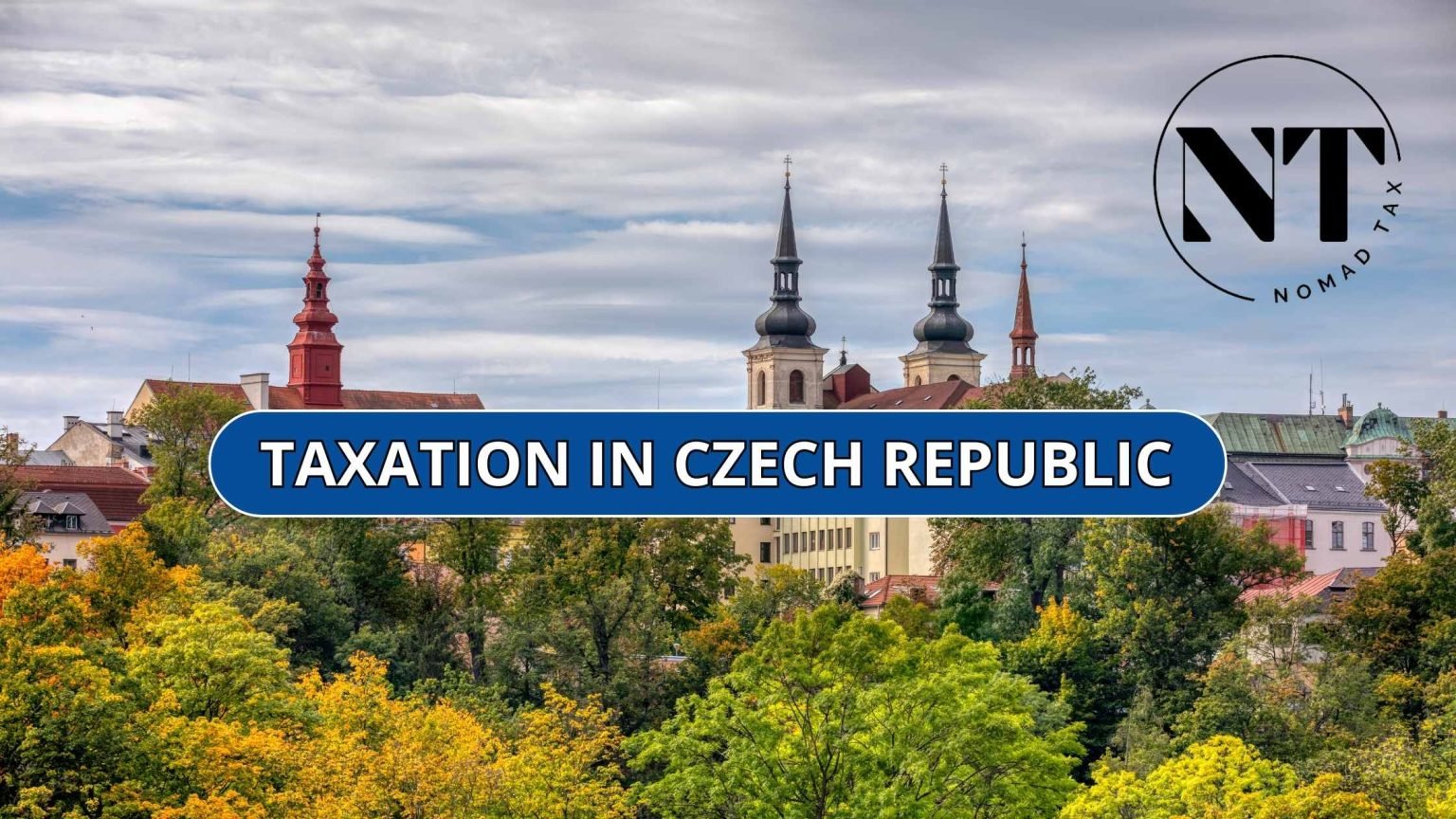We know you won’t regret making it this far.
In recent years, Europe has faced a series of economic challenges. Financial instability and uncertainty have been felt in many places. One of the main consequences of this economic downturn has been an increase in taxes. Governments across Europe have had to raise taxes to cover budget deficits. And while corporate taxes are more or less manageable, self-employed workers are feeling the brunt.
However, while in some countries taxes are simply exorbitant, others have chosen the opposite path, opting to offer the lowest possible taxes not only to encourage their own citizens to stay but also to attract foreigners to move to their country due to low taxes.
Today, we will talk about taxation in Czech Republic, which is one of those countries.

Indice del artículo
A complete guide for expatriates
Welcome back to our blog. For those who don’t know us, on this channel, we discuss the best ways to optimize your taxes. And today, we have something special prepared for you. Anyone who is self-employed can’t believe how incredible this program is and how much money they are legally saving on taxes.
This country offers tax incentives and deductions that can significantly reduce your tax burden. Additionally, you’ll be living in the heart of Europe, making it very easy and quick to travel to other countries for a weekend getaway. Although it won’t be necessary because the country itself offers a vibrant life with many leisure opportunities. The cities are quite developed but also have very beautiful nature.
For all nature lovers, you can go hiking in the summer; it has many routes, or skiing in one of the ski resorts in the winter. So, this country has it all. Plus, an agreeable climate as an additional bonus.
Moreover, most won’t have language barrier issues when communicating with locals as the majority speak English and German perfectly.

Some Data about the Czech Republic
- The Czech Republic, located in the heart of Europe, covers an area of 78,871 square kilometers.
- This country, also known as Czechia, is home to a population of 10,827,529 people, ranking 85th in the list of countries worldwide, composed of 196 nations. Czechia’s population density stands at 137 people per square kilometer.
- The capital of Czechia is Prague, and its official currency is the Czech Crown.
- In economic terms, Czechia ranks 48th in terms of its Gross Domestic Product (GDP) volume. The country’s public debt in 2022 amounted to 124,278 million euros, representing 44.1% of GDP. The per capita debt is estimated at 11,478 euros per inhabitant.
- It’s important to note that Czechia is among the countries with a low unemployment rate globally.
- The GDP per capita, an important indicator of the standard of living, stood at 25,850 euros in 2022, ranking the country 44th among the 196 nations in the per capita GDP ranking.
- Regarding the Human Development Index (HDI) developed by the United Nations to measure a country’s progress and reflect the living standard of its inhabitants, Czechia ranks 32nd.
- If your reason for visiting Czechia is business-related, it’s relevant to know that the country ranks 41st out of 190 countries included in the Doing Business ranking, which evaluates the ease of doing business.
- As for the Corruption Perceptions Index in the public sector of Czechia, it scores 56 points, placing the country 41st among the 180 nations included in this index.
And as always, in today’s blog, I’ll talk about how to save on taxes if you choose to move there.But before I do that, as always, if you need us to evaluate your personal situation, we’re just a phone call away.

Taxation in Czech Republic, One of the best in Europe?
Let’s continue exploring the taxation in Czech Republic. The Czech Republic offers a favorable environment for self-employed workers, providing various advantages.
However, it’s important to avoid the mistake of setting up a Czech capital company, known as S.R.O. While this option may have technical and tax benefits compared to a Limited Company (SL), the 19% corporate tax remains a significant burden, along with other taxes and social contributions related to salaries and dividends.
Instead, for residents in the Czech Republic, there is a special tax regime that is similar to that of self-employed workers in Spain, but with notable advantages. The so-called “Trade License” offers a very low tax burden until a certain turnover is reached.
While some recent modifications have decreased the attractiveness of this regime compared to the past, the opportunities remain favorable. Furthermore, the Czech Republic is a country with much to offer to self-employed workers and young entrepreneurs taking their first steps in the working world.
Earnings from Dividends, Interest, and Capital Gains in Czech Republic
Profits obtained through the receipt of dividends or interest are subject to a flat tax rate of 15% in the Czech Republic, regardless of the amount received.
Regarding capital gains, whether they come from investments in financial assets or real estate, taxes are applied according to the progressive rates mentioned earlier for labor income, which are 15% or 23%.
The exception applies to capital gains generated from the sale of property that you have owned for at least 5 or 10 years (depending on the purchase date) or in which you have resided for a minimum of 2 years. In this case, the gains are tax-free.

Rental Income tax in Czech Republic
Income from property rentals is also subject to a flat 15% tax in the Czech Republic, but it’s important to note that you have options for calculating the taxable amount.
One option is to calculate your net rental income before taxes, subtracting all expenses related to the property and its maintenance (mortgage interest, insurance, fees, repairs, etc.).
The other option is simply to reduce the total rental income by 30%. Therefore, if you earned 10,000 euros, you would only pay taxes on 7,000 euros when applying a 15% tax. In practice, this would be equivalent to a tax rate of 10.5% on total income.
Corporate Tax in Czech Republic
In the Czech Republic, companies are subject to a 19% corporate tax on their profits. This type of tax is applied uniformly, regardless of the company’s size or the amount of profit it earns.
As a result, the corporate tax rate in Czechia is lower than in other prominent European countries such as Spain (25%), France (31.3%), and Germany (29.8%). This makes the Czech Republic a highly attractive destination for companies looking to make investments.
VAT in Czech Republic
VAT taxes the consumption of goods and services in the Czech Republic and is divided into four categories:
The standard rate, at 21%, applies to all goods and services not subject to a lower tax rate. The first reduced rate, at 15%, is used for a wide range of products, including some food items, water supply, hotels, bars and restaurants, medical services, as well as cultural establishments and events.
The second reduced rate, at 10%, applies to certain food items, pharmaceuticals, newspapers, and books, including e-books. Finally, financial services, including insurance, and international transportation are exempt from VAT. As a result, the level of VAT in Czechia is very similar to that of other developed countries.

Who Will Benefit from the Czech Republic?
So, who will benefit from the Czech Republic? Anyone who works as a freelancer or is self-employed. First, they need to register as self-employed in the Czech Republic and obtain a trade license. The process to obtain the license is quite fast and straightforward. You must be at least 18 years old, be a citizen of the EU or reside in the EU, and have a clean criminal record.
After obtaining this license, as a self-employed individual, you can choose one of three tax models:
The 60/40 Model; Flat Tax; or Actual Expenses. There are two things I must mention about these models. First, one of them is a real game-changer, and second, regardless of the tax model you choose, filing is only required once a year.
- The flat tax means you have to pay a predetermined standard amount of money, which is 6,208 CZK, roughly equivalent to 250 euros at the time of recording this video. No additional accounting, paperwork, nothing. Those monthly payments cover your public health insurance, social security, and income tax. The only limitation with this approach is that your annual income must not exceed 2 million CZK, which is approximately 81-82 thousand euros.
- The other model, “Actual Expenses,” is the least attractive in my opinion, as most digital professions don’t have many expenses, and with this model, you’ll be able to deduct all the expenses you make and only tax the income.
- And the last model, which is also the most attractive, is the “60/40 model.” With this model, you divide your total gross income into 2 parts: 60% of your income is considered business expenses. And the best part is you don’t really have to prove they are actual expenses; no invoicing is needed to consider them as expenses. So, from the total income, you automatically deduct 60%, and the remaining 40% is taxed at a rate of 15%. Thus, the effective tax rate you would have in this case is only 6%.

In addition to the “Trade License,” Czechia offers a 40% deduction on intellectual property, such as books and software. This means that if you hold licensing rights, you won’t have to pay more than 9% in taxes on these assets, even if your income exceeds 2 million crowns.
This measure provides an attractive incentive for those involved in creating and marketing intellectual property, offering a favorable tax environment in the Czech Republic.
Not bad, right? Since in some countries, self-employed workers spend over 50% of their income on taxes. So, Czechia is truly generous. Again, there’s a limitation on the amount of income you can tax using this method; only the first 2 million CZK can be taxed in this model.
If you exceed this limit, the excess amount will be taxed at a rate of 23%. In addition to the 6% you’re paying, there’s an obligation to pay public health insurance and social security monthly, which would total approximately 5,666 CZK or 231 euros.
Tax Comparison: Spain vs. Czechia for Self-Employed Workers
Now, I’ll provide brief examples with estimated and approximate figures to illustrate why Czechia is an attractive country for self-employed individuals. It’s important to clarify that the data presented here are approximate examples.
Let’s take Manuel and Elena, both self-employed programmers with annual incomes of 72,000 euros each and approximate annual expenses of 12,000 euros. The difference is that Manuel lives in Spain, and Elena lives in Czechia.

Manuel in Spain
Manuel’s monthly self-employment fee amounts to 420 euros (5,040 euros annually). Additionally, Manuel pays around 17,683 euros annually in Personal Income Tax (IRPF).
After deducting expenses, self-employment fees, and IRPF, Manuel has 37,277 euros annually or 3,106 euros net per month.
Elena in Czechia
Elena, as she doesn’t exceed 80,000 euros in income, doesn’t need to register for VAT, and isn’t required to keep detailed expense records, as she automatically benefits from a 60% expense deduction.
Elena pays 1,944 euros annually for the health system and 4,205 euros in Social Security, totaling 6,149 euros annually or 512 euros per month. Although she pays more than Manuel in self-employment fees (420 euros), the difference is not significant.
Elena also pays 3,025 euros in IRPF.
After deducting expenses, self-employment fees, and IRPF, Elena has 50,826 euros annually or 4,235 euros net per month, which is 13,559 euros more per year than Paco.
It’s important to note that Elena is not required to register for VAT and only makes two IRPF payments per year, in May and December, only filing an annual IRPF return. In contrast, Manuel must file quarterly declarations.
Summary of Manuel and Elena
In summary, after considering expenses and taxes, Elena earns 36% more than Manuel. The difference in monthly incomes is significant, and this could seriously make Manuel consider the possibility of moving to Czechia.
CONCLUSION
If you need to get in touch with our service provider in the Czech Republic, you can find more information on our website. I hope you found the information helpful. If you have any additional questions, feel free to book a call with us. Thanks for watching, stay tuned, and keep learning.
FAQs
- Why is the Czech Republic mentioned as an attractive country for self-employed workers and entrepreneurs?
In recent years, Europe has faced economic challenges that have led to an increase in taxes in several countries. However, the Czech Republic has chosen to offer low taxes to attract entrepreneurs and self-employed workers. This country provides tax incentives and deductions that can significantly reduce the tax burden for self-employed individuals.
- What are some of the tax advantages that the Czech Republic offers to self-employed individuals?
The Czech Republic offers self-employed individuals the option to choose from different tax models, such as the 60/40 model, flat tax, or actual expenses. Each of these models has its own advantages, but in general, they allow for a reduced tax burden. Additionally, there is a 40% deduction on taxes on intellectual property, such as books and software.
- What are the requirements for becoming self-employed in the Czech Republic?
To become self-employed in the Czech Republic, you need to obtain a trade license. You must be at least 18 years old, be a citizen of the EU or reside in the EU, and have a clean criminal record.
- What is the 60/40 model in the Czech Republic, and how does it work?
The 60/40 model is a tax option in the Czech Republic that allows self-employed individuals to automatically deduct 60% of their gross income as business expenses, without the need for invoicing. The remaining 40% is taxed at a rate of 15%, resulting in an effective tax rate of 6%.
- What are the tax rates in the Czech Republic for dividends, interest, and capital gains?
Profits obtained through dividends or interest are subject to a flat tax rate of 15% in the Czech Republic. Regarding capital gains, whether they come from investments in financial assets or real estate, taxes are applied at the progressive rates mentioned earlier, which can be 15% or 23%. However, there are exemptions for capital gains generated from the sale of property under certain conditions.
- Who will benefit from the Czech Republic?
So, who will benefit from the Czech Republic? Anyone who works as a freelancer or is self-employed. First, they need to register as self-employed in the Czech Republic and obtain a trade license. The process to obtain the license is quite fast and straightforward. You must be at least 18 years old, be a citizen of the EU or reside in the EU, and have a clean criminal record.
- Where can I find more information about the tax and legal aspects of becoming self-employed in the Czech Republic?
If you wish to obtain more information about the tax and legal aspects of establishing yourself as a self-employed individual in the Czech Republic, we recommend visiting our website or getting in touch with our service provider in the Czech Republic. You can also schedule a call with us to discuss your personal situation.
By the way, you can always visit our YouTube channel!



